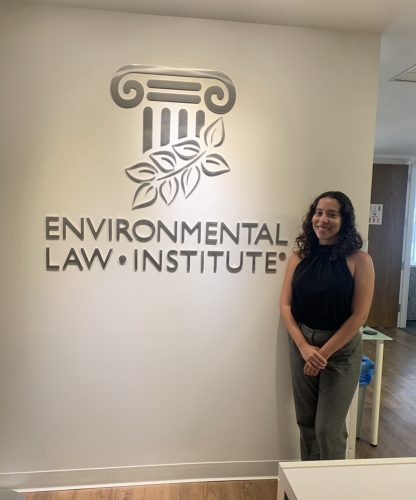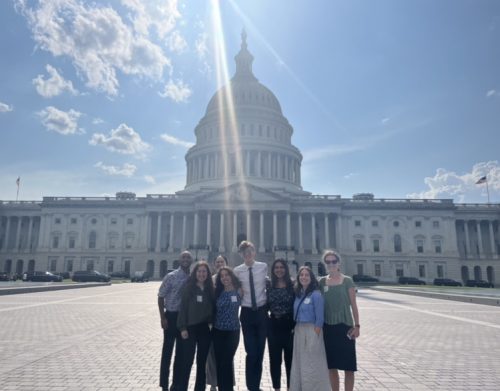 This summer, I had the opportunity to work as a research and publications intern for the Environmental Law Institute (ELI) in Washington D.C. — an internationally recognized nonprofit organization dedicated to making “law work for people, places, and the planet.” As my internship comes to an end, I can’t help but reflect on the immense impact that my previous experience working with the University of Florida Thompson Earth Systems Institute (TESI) had on my success at the ELI.
This summer, I had the opportunity to work as a research and publications intern for the Environmental Law Institute (ELI) in Washington D.C. — an internationally recognized nonprofit organization dedicated to making “law work for people, places, and the planet.” As my internship comes to an end, I can’t help but reflect on the immense impact that my previous experience working with the University of Florida Thompson Earth Systems Institute (TESI) had on my success at the ELI.
Last year, I worked on a research project under the guidance of TESI director Megan Ennes, an assistant curator of museum education at the UF Florida Museum of Natural History. Our research analyzed the effectiveness and long-term benefits of a climate communication training program developed by the National Network of Ocean and Climate Change Interpretation (NNOCCI) in 2010.
Throughout the project, I transcribed and coded interviews, analyzed survey data, reviewed relevant literature, and presented our findings at the League of Environmental Educators in Florida conference. Not only did working with TESI reaffirm my interest in research, climate change communication, and program development, but it also greatly prepared me for my following internship at ELI. As a research and publications intern at ELI, my daily responsibilities consisted of researching several topics related to environmental law and governance, writing memos, reviewing academic articles, organizing and sorting through online resources, developing communications material, and planning events — all of which I began learning while at TESI.
This summer, I worked on a variety of research projects, including ELI’s Climate Judiciary Project, which provides objective information to judges about the science of climate change and its relevance to litigation. My experience working on climate change communication topics at TESI was one of the primary reasons I was selected to work with the Climate Judiciary team, and the strategies I learned for framing climate science in an engaging and digestible format were invaluable. Additionally, working with TESI helped me feel comfortable reviewing academic literature and preparing bibliographies.
Furthermore, the technical skills that I learned while working with TESI (such as organizing and analyzing data using Excel) were extremely beneficial on another ELI project, where I created an Excel database that analyzed government-to-government consultation between Tribes in California and state/local agencies. This data provided insight into the relationship between agencies and Tribal governments and will be used to help advocate for greater inclusion of Indigenous people in local decision-making.

Lastly, my experience presenting research at the League of Environmental Educators in Florida Conference during my internship with TESI prepared me to present independent research that I conducted at ELI. Throughout the summer, ELI interns were given the opportunity to conduct their own research, and I decided to explore the existing legal avenues in the U.S. for addressing transnational climate migration. I felt much more comfortable presenting my own research and developing presentation materials because of my prior experience with TESI.
Overall, I learned so much about environmental law and policy this summer at the Environmental Law Institute, and I am highly appreciative of the way working with TESI propelled me into this field. As I finish my undergraduate degree at UF and apply for graduate school, I hope to continue working on similar research related to environmental law and policy.